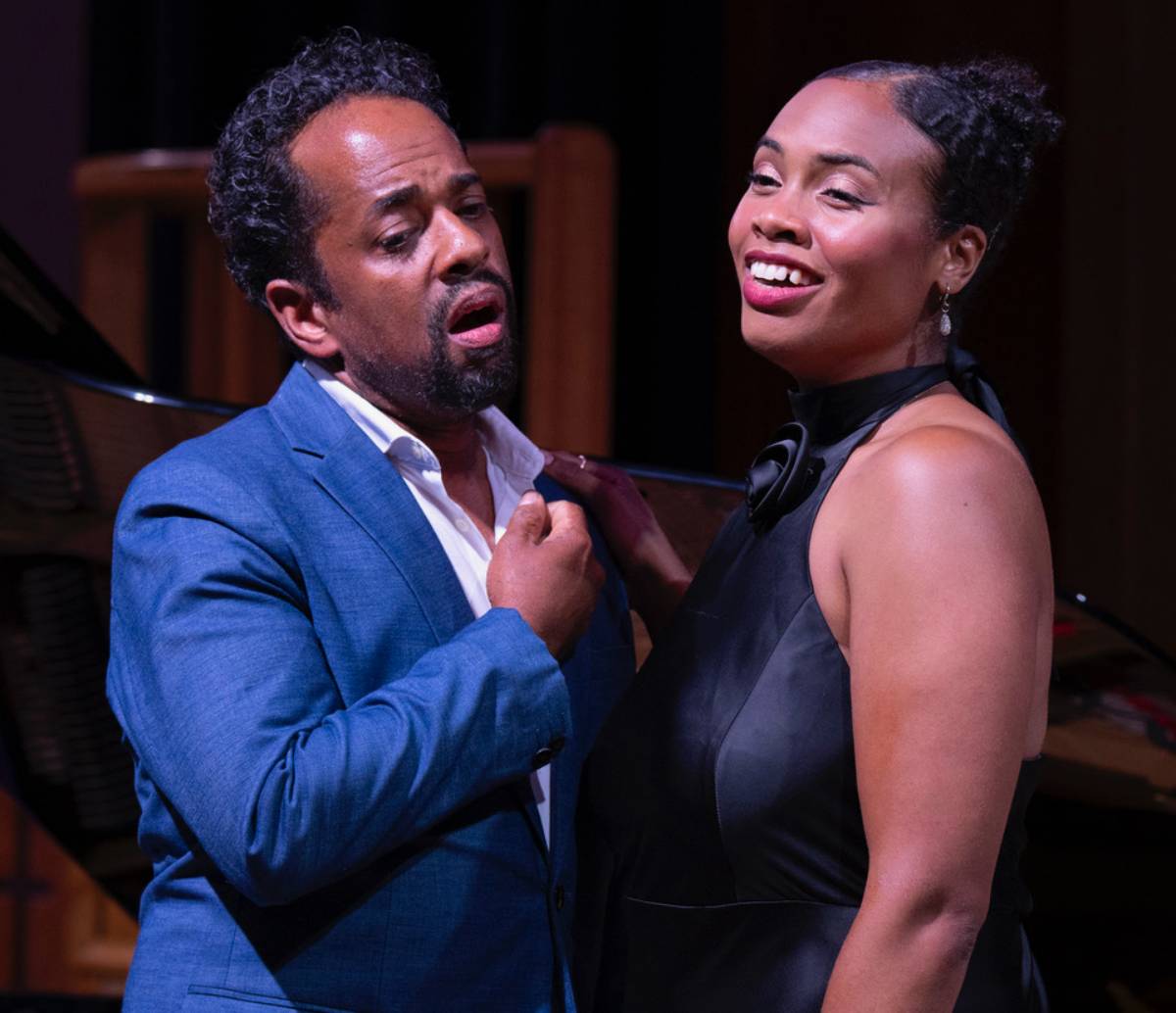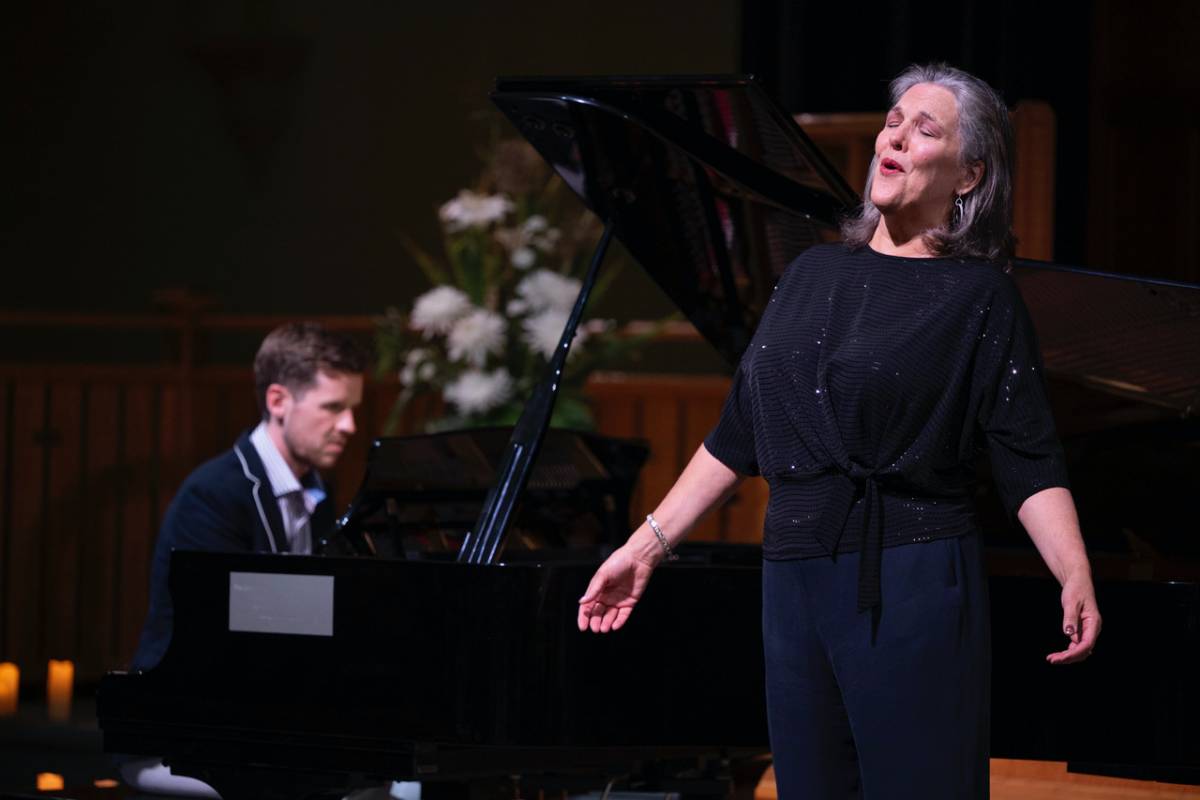Collingwood Music Pageant: Gershwin Gala. Creative Director & pianist Daniel Vnukowski; soprano Adrianne Pieczonka, soprano Jonelle Sills; bass-baritone Justin Welch; pianist Steven Philcox. July 18, 2025, First Presbyterian Church, Collingwood.
“Are you a musician?” the lady subsequent to me requested.
We had been sitting within the first row of the balcony of the First Presbyterian Church ready for the Gershwin Gala — the grand finale of this yr’s Collingwood Music Pageant — to start.
“No,” I informed her. “I’m a journalist. Do you play music?”
“I play with music,” she stated, evenly chuckling. “I pay attention principally. I fell in love with a chunk of music and, at 90, I went out and purchased a keyboard. I’m wondering what number of candles there are.”
She was referring to the chancel beneath, which, along with a grand black piano and an ornate flower association on a white column, was coated in fake candles glowing orange.
Later, throughout intermission, I attempted to depend the candles — roughly 190 — however earlier than the present started correct I needed to catch her title. “Jean Morton,” she stated, sharing that she was born in Winnipeg, and lived throughout Canada earlier than deciding to retire within the South Georgian Bay.
I observed, like me, Jean was carrying a lanyard, however hers learn “Maestro Cross,” which grants all-access to each competition occasion that, this yr, included masterclasses with the likes of pianist Angela Park, violinist Sharon Lee, composer Ian Cusson, and performances by Canadian Brass, the Elmer Iseler Singers, the Montréal Guitare Trio and the Payadora Tango Ensemble.
The Collingwood Music Pageant was based by its creative director Daniel Vnukowski in 2019, however, in his opening remarks, he shared that it started as a dream in 2017 as a profit live performance throughout a snowstorm, which was attended by the late Marilyn Knowles, an area resident, music lover and fierce supporter whose donation made the night’s efficiency attainable.
“It doesn’t finish right here,” Vnukowski stated of the bitter-sweetness of the competition’s finish, teasing there have been occasions and packages within the works.
However, first a style of the Nice American Songbook and the music of “the one who bridged all of it collectively”: composer George Gershwin.

ACT 1
Wearing a crisp white shirt, black bowtie and black velour blazer, Vnukowski started with Three Preludes, which had been first carried out by Gershwin in 1926.
The primary, Allegro ben ritmato e deciso, was playful, fast-paced and deceptively discordant, whereas the second, Andante con moto, was mournful and bluesy, permitting extra subdued tones to come back via and giving us a way of Gershwin’s vary. The third, Agitato, was a return to his punchy sensibility, the place a dialog between the main and minor notes passed off, evoking photos of practice sequences in silent movies.
Vnukowski, an impassioned performer, appeared to sprint off every prelude with ease, all the time concluding with such dramatic aptitude, setting the tone for the evening.
Following him onto the chancel was the dapper pianist Stéphane Mayer and the soprano Adrianne Pieczonka, who wore a bejewelled black prime that glittered within the highlight as she moved, performing the well-known I Received The Rhythm, Love Walked In, and Somebody to Watch Over Me.
As every track progressed, it turned clear that what Pieczonka, and by extension Gershwin, had been considering was utilizing the music, and the voice, to articulate the vestiges of affection: of affection that has the ability to alter every part in a single’s life.
“Forgot the gloom of the previous/one look and I/had discovered my future eventually,” she gracefully sang, as if from expertise.
After her, the soprano Jonelle Sills, in a sublime, black, floor-length costume adorned with a black flower on prime, arrived on the chancel to sing Embraceable You and The Man I Love.
As Mayer, who typically bobbed his head or tapped his foot to the beat, performed the opening chords, it was fascinating watching Sills put together to carry out as she smiled extensively and appeared out on the viewers, as if settling into a personality and absorbing our anticipation so she may unleash the power of her voice, which she proceeded to do, balancing the operatic and Broadway kinds in such a means that she was in a position to make the songs her personal.
Her voice reached the excessive ceilings and despatched a shiver up my backbone.
The bass-baritone Justin Welsh, then, had the obligation to convey us again all the way down to the earth, to reminding us of the significance of reminiscences in his rendition of They Can’t Take That Away From Me, which was made standard by Fred Astaire.
“The way in which you put on your hat/the best way you sip your tea,” he lusciously sang, “The way in which you sing off key/the best way you hang-out my desires.” On this record of photos drawn up by the attentive lover, we see how the gestures we consciously and unconsciously produce in every day life can impression these round us, to develop into one thing to be catalogued and privately cherished.
Prefacing the controversial, but extremely profitable, popularity of Swanee, Welsh had us hanging onto each phrase, reveling within the pleasures of his timbre.
Earlier than intermission, Vnukowski returned to the stage and stated he forgot to ask us if we needed to listen to Rhapsody in Blue now or later.
My seat-mate, Jean, was, together with a lot of the viewers, in favour of now.
You will need to observe right here that one of many challenges positioned on bringing Gershwin’s music to life was the choice to carry out, in Vnukowski’s phrases, “a purely acoustic” model, that means that the grand, jazzy sensations from the Rhapsody would solely be communicated via the piano.
This isn’t the Leonard Bernstein model.
However, with the church’s ceiling bathed in blue mild, together with his athletic musicianship on full show, with full submission to the music, Vnukowski managed to evoke the unique spirit of this masterpiece.
He possessed sufficient ardour to conjure up an orchestra out of a piano.
Jean was the primary one up for the standing ovation.

ACT 2
Throughout intermission I remained in my pew and noticed the viewers members — which included the soprano Ambur Braid — who all appeared to know one another and had been chatting away.
It jogged my memory of a line I learn from the Collingwood Music Pageant’s assertion of intent:
“Analysis has proven the social, bodily and cognitive advantages of internet hosting a music competition in its group, enhancing folks’s moods and nurturing a way of belonging.”
Coming from Toronto, the place we’re spoiled with the riches of tradition from all sectors, I may see the best way that bringing music into these areas, and fostering the potential of future generations, was important, and will see the way it enlivened the group.
The second act carefully adopted the format of the primary.
There was Vnukowski taking part in Strolling The Canine and Rialto Ripples, transporting us to a lounge in New York within the Nineteen Thirties, and Pieczonka returning to sing — cleanly, crisply — of affection in Isn’t it a Pity and Love is Right here To Keep, the place she broke away from the track sheet to supply knowledge.
“The older I get, the sooner the world turns,” she stated. “We have to maintain onto love — the one concrete factor.”
When she sang By Strauss, settling into the Germanic position, she lastly appeared unrestrained.
There was Welsh and Sills, who took turns showing on the chancel to sing excerpts from Porgy and Bess, one in every of two opera’s Gershwin composed earlier than his early loss of life in 1937.
Welsh charmed the viewers with I’ve Received Loads of Nothin and It Ain’t Essentially So, encouraging the take part in a name and response that took us out of our complacent spectatorship. However, as soon as once more, it was Sills, who gave her spin on Summertime and the devastating My Man’s Gone Now — with its piecing cry — that made the night unforgettable.
Each critic retains a list of gestures from the performances they see and when Sills allowed the over-wealth of feelings of the top of the track to beat her and select to fall again into the curve of the piano with the ultimate observe, I’d discovered one other one so as to add to it.
She conveyed the drama of the opera and the character onto the chancel — an excerpt turned occasion.
After Welsh and Sills got here collectively for a touching duet of Bess, You Is My Lady Now, and Vnukowski returned for a short improvisation on Gershwin (à la Earl Wild), all the performers appeared on the chancel to reprise I Received The Rhythm as the ultimate quantity.
“Who may ask for something extra?” all of them sang.
It was the proper observe to shut the season — feeling full of affection, music and inspiration.
As I made my means down the steps, noticing that a couple of members of the viewers had been holding seat cushions, a lady snapped her fingers and requested us all if we “acquired the rhythm.”
I didn’t reply her then, however I’ll now: I do certainly.
By Nirris Nagendrarajah for Ludwig-Van.com
Are you trying to promote an occasion? Have a information tip? Must know the most effective occasions occurring this weekend? Ship us a observe.
#LUDWIGVAN
Get the every day arts information straight to your inbox.

